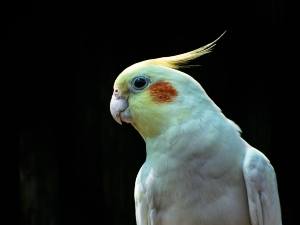
If your cockatiel starts to bleed then the bird can quickly die due to a loss of blood. This article looks into why your cockatiel is bleeding under its wing.
Table of Contents
Cockatiel bleeding under its wing:
All animals have blood and all animals bleed, however, sudden bleeding is cause for alarm.
If your cockatiel starts to suddenly bleed you’d be right to be worried, this is why your cockatiel may be bleeding under its wing:
Blood feather:
If your bird is bleeding under its wing then the bird likely has a broken blood feather.
Birds get rid of old feathers and grow new feathers on a regular basis. When old feathers fall off of a bird’s body a new feather starts to grow to replace the old feather.
The new feather starts off as something that looks like a spike or a quill coming out of the bird’s skin and grows into the feather shaft, the feather shaft is the tubular middle part of the feather.
During feather growth, the shaft of the feather has blood running through it, and this blood delivers nutrients that allow the feather to develop.
The feather during this stage is called a blood feather. It is very easy to spot a blood feather as it is dark red in color.
When the feather is done developing, the blood in the blood feather will go back into the bird’s body and the shaft of the feather will be hollow and clear.
If the blood feather becomes injured then it can start to bleed, and the bleeding can be quite heavy.
Your cockatiel wing can start to bleed because the wing experienced trauma like it being bumped too hard, when flying, or the wing may have become injured during a fall.
If the shaft of the bird’s feather developed a crack, and started to bleed but clotted up, and the bird picked at the area, then the feather may bleed again.
It is more common for birds to develop blood feathers on their wings than on other parts of their body.
What to do:
Observe the blood feather to see how much it is bleeding and if it stops on its own. The bleeding may stop on its own but if it doesn’t then you may need to stop the bleeding yourself.
If you can’t stop the bleeding then you may have to take the bird to the vet.
If the bleeding isn’t stopping on its own then you can use a powder like styptic powder, cornstarch, or flour to help stop the bleeding.
You can dip the bleeding feather into the powder or you can pour it on the bleeding area, avoid getting the powder into the bird’s face and letting the bird inhale it.
You can also pour the powder of choice onto a sterile square gauze and put pressure on the bleeding area for several seconds to help stop the bleeding.
These powders will help the area clot up. The bleeding on your cockatiels wing should stop within 3-5 minutes, if the bleeding does not stop then you may have to take the bird to the vet.
You halve the option of removing the blood feather yourself but this is not recommended as hemorrhaging can occur when you pull the feather out resulting in severe and even fatal blood loss.
You may also unintentionally break the bird’s wing if you try to remove the bird’s feather yourself if you don’t have any experience successfully removing a broken blood feather.
The vet will be able to stop the bleeding by pulling the feather out. If the vet chooses to do this then they will also likely give the bird pain medications to keep the bird from suffering.
Taking the bird to the vet is especially recommended if the bird has picked at the cracked and clotted blood feather. The bird may have picked at the opening and dislodged the clot and caused even more bleeding
Once the vet has removed the blood feather you can take your cockatiel home and place it in a dark and quiet place to recover.
Give your bird it’s pain medications and ensure that it is comfortable during its recovery. A new feather should grow in the old broken feather’s place soon enough.
If you enjoyed this article then you may also be interested in other bird related articles. Here are some articles that you may be interested in: Baby Budgie Eating Poop, What To Do When Budgie Eggs Hatch, What To Do With Infertile Budgie Eggs, Do Male Budgies Sit On Eggs, Do Budgies Sit On Their Eggs At Night, Budgie Abandoned Eggs

